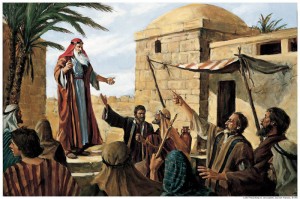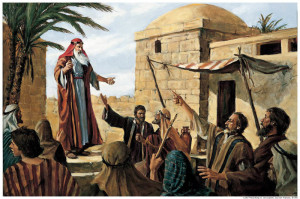Members of the Church of Jesus Christ of Latter-day Saints have a strong respect for authority. We believe in obeying the law. Within our church organizations, we show respect for our leaders and follow the chain of command.
 When Nephi, a Book of Mormon prophet, was a young man, his family fled Jerusalem after his father, the prophet Lehi, was threatened with death for calling the people to repentance. While traveling in the wilderness, Nephi, the family’s hunter, broke his bow and the family was threatened with starvation. You can read a complete summary of the events in Nephi and the Broken Bow.
When Nephi, a Book of Mormon prophet, was a young man, his family fled Jerusalem after his father, the prophet Lehi, was threatened with death for calling the people to repentance. While traveling in the wilderness, Nephi, the family’s hunter, broke his bow and the family was threatened with starvation. You can read a complete summary of the events in Nephi and the Broken Bow.
At this time, Lehi, who had never before faltered, momentarily lost faith and complained to God. He was an elderly man, tired, and hungry, and just for a brief moment in time, he lost faith and became upset. In the world, Nephi might have seen this as an opportunity to wrest leadership from the next person up the ladder. After all, he was ready. He had already, even though he was very young, seen a vision and talked with angels. He had been working hard to try to reform his wayward brothers. During times when Lehi wasn’t present, such as their journeys back to Jerusalem for various things, it was Nephi who had needed to take charge and keep things under control, even though he was the youngest son. In the corporate world, Nephi would have been poised for a power struggle.
But this was not the world. It was a family, but more importantly, it was the church. Lehi was not just Nephi’s father, but his spiritual leader, the prophet. Prophets are only human, as the Bible frequently makes clear. They aren’t perfect. They have their bad days just as anyone else does.
Nephi did not set up a power struggle or take over. He made a new bow and then gently, respectfully, went to his father and asked where to hunt. He demonstrated that he still saw Lehi as the prophet and leader of the family. He showed a powerful respect, and as a result, he helped Lehi turn back to his faith and carry on.
Elder Marion D. Hanks said,
“I count this one of the really significant lessons of life in the book, and, I repeat, the pages are full of them. A son who had strength enough, and humility enough, and manliness enough to go to his wavering superior and say, ‘You ask God, will you?’ because somehow he knew this is how you make men strong, that wise confidence in men builds them. Lehi asked God and God told him, and Lehi’s leadership was restored” (Steps to Learning, Brigham Young University Speeches of the Year [Provo, 4 May 1960], p. 7).
It was quite possibly Nephi’s request that reminded Lehi of his responsibilities to the leadership of the family and the church. He approached God, repented, and returned to his role as the leader. Only when he died did Nephi take over church leadership, and begin taking full responsibility for those in the group who wanted to follow God. Until that moment, Nephi allowed his father to stay in charge, just as God had chosen.
The late Terrie Lynn Bittner—beloved wife, mother, grandmother, and friend—was the author of two homeschooling books and numerous articles, including several that appeared in Latter-day Saint magazines. She became a member of the Church at the age of 17 and began sharing her faith online in 1992.


